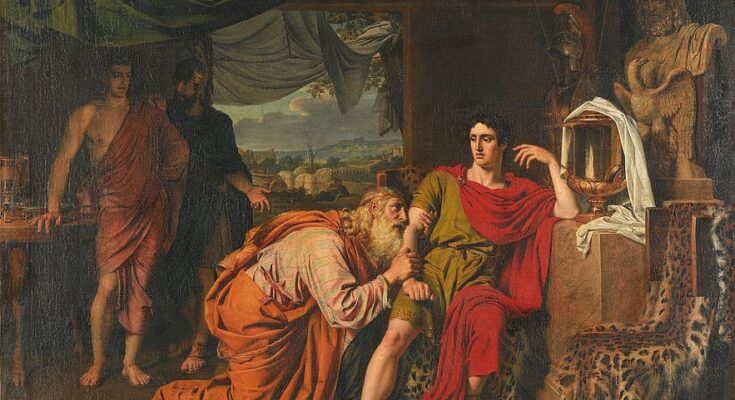
King Priam of Troy was one of the most tragic and prominent figures in the mythology of ancient Greece. He was the last ruler of the mighty city of Troy, a place that was destined to become one of the most epic and well-known battlefields of the entire antiquity.
The life of King Priam, as well as his reign, was defined by both great prosperity for his family and its subjects but also by unimaginable tragedy and loss due to fate’s odd twists and turns.
Priam was a significant monarch in ancient Greece’s mythology. He witnessed the destruction of his beloved city and the brutal deaths of many of his children during the legendary Trojan War which sparked enormous reverberations across the ancient Greek world.
Priam’s early years in the mythology of ancient Greece
Priam was actually born under the name of Podarces. He had royal blood running in him. as he was the son of the famous King Laomedon of Troy. The legendary Greek hero Heracles (Hercules), who had come to punish Laomedon for breaching a promise, saved the life of young Priam.
Podarces, as he was known back then, was ransomed in exchange for a golden veil that was meticulously designed by his sister Hesione. This gave him the name “Priam.”
According to Greek etymology, the name Priam (Priamos in Greek) comes from the verb priamai, which is ancient Greek for “to buy.”
Heracles not only saved Priam but also helped him to ascend to the throne of Troy. During his reign, the city and its people thrived culturally and financially. Priam managed to restore the fortifications of his beloved city, strengthened the soldiers by a series of reforms, and even formed an alliance with the Phrygians to wage war on the Amazons.
He built a splendid palace of white marble as a tribute to Troy’s riches.
Family tragedies during the Trojan war
Priam married several times, but his love life was not successful. His most notable marriage was to Hecabe (Hecuba) and he had many children with her. There is no extensive list of the children of Priam, but according to different Greek mythology variations, he had a total of eighteen daughters and sixty-eight sons.
According to Homer’s Iliad, Priam had fifty sons. His children included the courageous Hector, his favorite son and Troy’s greatest warrior, as well as Paris, whose acts would seal the demise of the city because of his consequential actions.
The kidnapping of Helen by Paris, the wife of Spartan king Menelaus, eventually unleashed the wrath of the Greek troops on Troy, initiating the Trojan War and changing the ancient Greek world forever.

The fall of Troy and Priam’s death
As the war progressed, King Priam witnessed the deaths of several of his sons. These tragic events included the murder of Hector, who succumbed to the powerful fighting skills of Achilles. In a truly moving demonstration of fatherly love, Priam went into the Greek camp and begged Achilles for the return of Hector’s body.
In Book 24 of The Iliad, King Priam is described as visiting the Greek camp to plead with Achilles for the return of his son Hector’s body. According to Homer, Priam was guided by Hermes and was disguised as a Greek soldier.
He then bravely entered the enemy camp and kissed Achilles‘ hand. In an emotional appeal, he manages to move Achilles—who is still mourning his friend Patroclus—and agrees to return Hector’s body in exchange for a ransom. Achilles, moved by the old king’s sorrow and memories of his own father, gave in and let Priam properly bury Hector.
As Troy eventually fell to the Greeks, Priam suffered a horrible death. According to Virgil’s Aeneid, Neoptolemus (also known as Pyrrhus), son of Achilles, killed Priam’s son Polites in front of the king’s eyes. When Priam tried to confront him, Neoptolemus killed the aged king on top of Zeus’ altar.
In other versions of this tale in Greek mythology, Neoptolemus was said to have killed King Priam using the body of Priam’s infant grandson, Astyanax—one of the most heinous crimes encountered in Greek mythology.
By suffering such a horrible death, King Priam sealed the demise of his once-thriving city, legendary Troy; a city so fateful that its name became eternal in ancient Greek mythology.



